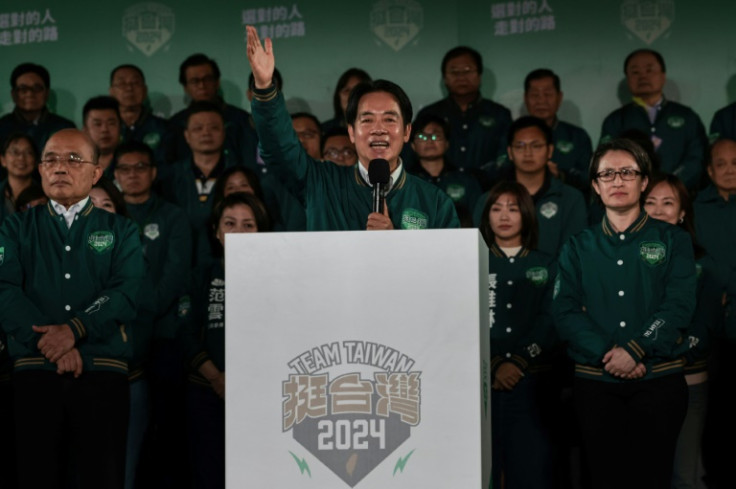5 ASEAN Countries Reaffirm Commitment To 'One China' Policy After Taiwan's Pro-Sovereignty Party Wins

KEY POINTS
- Cambodia reaffirmed its "resolute adherence" to the policy
- Manila, which has seen tensions rise with Beijing in recent months, also confirmed its commitment
- Singapore had a more neutral stance after China reiterated its opposition to "Taiwan independence"
Several members of the Association of Southeast Asian Nations (ASEAN) have reaffirmed their commitment to the "One China" policy following the presidential election in Taiwan, which saw the self-governing island's ruling Democratic Progressive Party (DPP) score a historic third consecutive victory.
Taiwanese voters ignored China's warnings that the re-election of a pro-sovereignty leader would trigger further tensions with Beijing as they handed Vice-president Lai Ching-te a comfortable win. The Taiwanese government also told Beijing to "face reality" and respect the results of the election.
After Lai was declared Taiwan's president-elect, the Chinese foreign ministry reiterated that "there is only one China in the world and Taiwan is part of China."
"We believe that the international community will continue to adhere to the one-China principle, and support the Chinese people's just cause of opposing 'Taiwan independence,'" it added.
The Taiwan question is China’s internal affair. Whatever changes take place in Taiwan, the basic fact that there is only one China in the world and Taiwan is part of China will not change. The one-China principle is the solid anchor for peace and stability in the Taiwan Strait.
— Spokesperson发言人办公室 (@MFA_China) January 14, 2024
Despite longstanding territorial disputes with some ASEAN members, some countries in the bloc have since reaffirmed their support for the "One China" policy.
A spokesperson for Cambodia's Ministry of Foreign Affairs and International Cooperation, in a statement Sunday, reiterated the country's "resolute adherence" to the policy, adding that it recognizes Beijing as "the sole legitimate authority representing the entirety of China."
Indonesia echoed the same sentiments, albeit without an official release from the foreign affairs ministry.
"Indonesia is closely observing the developments in Taiwan. Indonesia will consistently adhere to the One China Policy," Lalu Muhammad Iqbal, Indonesian foreign ministry spokesperson, told the Jakarta Globe.
The Philippines, which has had multiple skirmishes with China over the past few months due to incidents in the disputed South China Sea, declared its stance through a statement released by the Department of Foreign Affairs.
"The Philippines is committed to its One China Policy. The Joint Communique states that the 'two governments agree to settle all disputes by peaceful means... without resorting to the use or threat of force," the DFA statement said.
At a press briefing Monday, Vietnam's foreign ministry spokesperson, Pham Thu Hang, said the government "persistently follows" the One China policy, adding that it only maintains economy-linked relations with Taiwan and nothing on the state level.
Singapore had a more neutral stance on the election. The city-state welcomed the election's conclusion and congratulated Lai and the DPP on their victory.
"Singapore shares a close and longstanding friendship with Taiwan and the Taiwanese people, and will continue to grow this relationship based on our 'One China' policy," Singapore's Ministry of Foreign Affairs (MFA) said Sunday.
Other ASEAN nations have yet to comment on the Taiwanese presidential election and China's stance regarding Taipei's bid for full independence.
Meanwhile, Washington sent an unofficial delegation to the island Monday following the weekend election. Lai hailed Taiwan's "solid partnership" with the U.S., saying both share the "core values" of freedom and democracy.
© Copyright IBTimes 2025. All rights reserved.






















